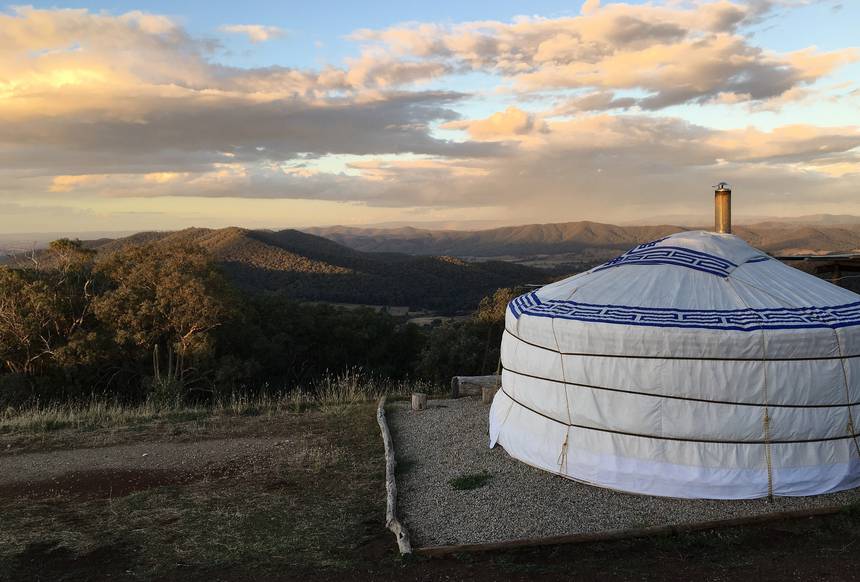We don’t have time for purity tests.
“Delete this garbage treehugger.” That’s what one commenter said the last time I tried to discuss modern environmentalism’s excessive focus on personal responsibility. Indeed, from my original defense of eco-hypocrisy to calling out those who call others out, I feel like much of my writing here at TreeHugger has been on this topic.
And it has often been misconstrued.
So I’m going to try, perhaps foolishly, to give it one more go. But I’m going to keep it brief. For those who would prefer a more in-depth read, I’ve published a longer version over on Medium. The basic argument goes like this:
I’m deeply concerned that we’ll reach a point of no-return on climate crisis, and a subset of environmentalists—those who are obsessively focused on personal footprints and individual responsibility—will be hidden away in an off-grid yurt, congratulating themselves on not having caused it. Failing to recognize, of course, that they also didn’t stop it:
A crackly voice comes in over the hand-crank, solar radio telling them that all is finally and irrevocably lost.
“It’s not our fault”, says one, patting their friend gently and reassuringly on the back.
“True…” nods another.
“It wasn’t us who did it.”
There’s nothing wrong with living lighter on the planet. Indeed, I regularly make efforts to reduce my personal footprint myself. I am just not convinced we should spend too much time talking about it. In a world where unsustainable choices are the default option, where fossil fuels are excessively subsidized, and where environmental costs are not borne by those responsible for the damage, living a truly sustainable life means swimming upstream.
This is actually why oil companies and fossil fuel interests are all too happy to talk about climate change—as long as the focus remains on individual responsibility, not collective action. In fact, one of the core pillars of the green lifestyle movement appears to have been popularized by a certain well-known energy company:
Even the very notion of “personal carbon footprinting” — meaning an effort to accurately quantify the emissions we create when we drive our cars or power our homes — was first popularized by none other than oil giant BP, who launched one of the first personal carbon footprint calculators as part of their “Beyond Petroleum” rebranding effort in the mid-2000s.
This push for personal responsibility over collective action isn’t just useful in terms of misdirection, it also serves to discredit those who would push for political solutions. Fortunately, however, a new breed of environmental activists appears to be cottoning on. Having learned from the headlines that trashed Al Gore for his oversized house, freshman congresswoman Alexandria Ocasio-Cortez recently faced criticisms of her “hypocrisy” with a swift, efficient reminder that our personal footprints are largely beside the point:
I also fly ✈️ & use A/C
Living in the world as it is isn’t an argument against working towards a better future.
The Green New Deal is about putting a LOT of people to work in developing new technologies, building new infrastructure, and getting us to 100% renewable energy. https://t.co/DZGE1WwLbn
— Alexandria Ocasio-Cortez (@AOC) March 3, 2019
That said—and this is where my efforts usually get misconstrued—I am not arguing that personal lifestyle change doesn’t matter. It just matters for a different reason than most advocates seem to focus on. The goal is not, as BP would have us believe, to “save the world one bike ride at a time” or limit each individual’s personal carbon footprint. Instead, it’s to use specific, targeted lifestyle changes as a lever of influence, through which we can bring about broader, more structural change.
Take the streets of Amsterdam as an example. It’s a known fact that the city was well on its way to a Westernized, car-centric model of development in the sixties. But residents pushed back successfully.
#cycling ::: amazing old photos of amsterdam show how the bike capital got rid of (most) cars pic.twitter.com/BuEORtn31F ::: via @adele_peters
— cycling project one (@cycling_one) January 1, 2016
Cyclists did that. And they did so using BOTH activism and personal lifestyle changes. But those changes were primarily important because of the role they played in creating wider, systemic change.
Of course, it’s tempting to ask why this matters. After all, if someone wants to take shorter showers, “let it mellow if it’s yellow”, or otherwise whittle down their footprint to zero, aren’t they still helping to reduce our overall planetary footprint? The answer to that is a resounding yes. I applaud any and all lengths any individual goes to to reduce their own impact; I just ask folks to be careful about how they advocate such efforts to others.
A movement is finally building to demand real, systemic change that meets the scale of the crises we face. We cannot build that movement if we apply purity tests about who can or cannot be an environmentalist, based on their personal carbon footprint.
That’s all I have. I hope I haven’t angered anyone too badly. You can head over to Medium to read my full defense of eco-hypocrisy. And follow me over on Twitter if you want more from this particular eco-hypocrite.
